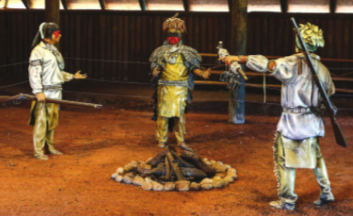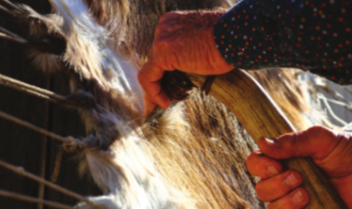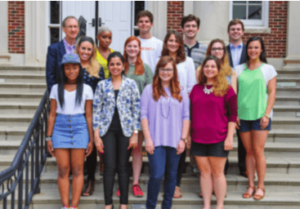
The tan, wrinkled hand of Pat Greenwood cusps a wooden spoon stirring a pot filled with pashofa, a steaming mixture of pearl hominy and pork, along with a healthy sprinkling of Chickasaw tradition and history.
Growing up in a household with strong Chickasaw roots, Greenwood, 72, was surrounded by the traditions her ancestors had practiced generations before.
“Well, I watched my mom and my brother, who cooked pashofa outside, just like this,” Greenwood said, stirring her big cast iron pot in a replica Indian village during the Chickasaws’ Three Sisters Festival. “That’s how I learned how to cook it. Of course nowadays, we cook it in a crockpot.”
Some traditions, like cooking pashofa, are winning the fight to remain prevalent, adapting to a fast-moving world.

Others may be losing the battle.
“Our language is almost obsolete,” Greenwood said. “It’s going. We have to teach the children how to speak the language.”
Determined to cling to its heritage, the tribe is investing in its children as a way to invest in its culture. There is a dazzling array of programs and opportunities designed to educate youth, from stickball leagues to classroom visits from elders.
Greenwood has worked for the Chickasaw Nation for more than 20 years. She has visited schools to teach children about the old ways. Sometimes, her classroom duties overlapped into her daily life.
Her husband, a railroad worker in Amory, Mississippi, brought her to the tribe’s North Mississippi homeland frequently. For a time, they even lived there.
“I got to talking to people and a lot of them said, ‘Well, I’ve never seen a Chickasaw before,’” she said.
People, children, and adults would rub Greenwood’s arm and stroke her hair, as if to confirm she was real. They acted as if Indians were a thing of the past, as if they didn’t exist anymore.
“I have my own card that shows how much Chickasaw I am,” Greenwood bragged. “I don’t have a roll number. I have to use my grandmother’s and my grandfather’s.”
From 1898 to 1906, the government required members of the Five Civilized Tribes (Chickasaw, Choctaw, Seminole, Creek, Cherokee) of the Southeast to sign up on the Dawes Roll. If they didn’t, they lost government recognition of their Indian citizenship even if they had a long lineage of Indian ancestors. Suspicious of the government, some were scared to claim membership so they lost the right to tribal benefits and a part of themselves as well.
It was preceded by The Dawes Act of 1887, which made it federal policy to “civilize” and assimilate Native Americans into mainstream American society. Children were sent to schools that punished them for speaking their own language and tried to rid them of all vestiges of native culture. And yet enough Chickasaw held onto their culture long enough to pass it on to others.
“I know it, I have lived it, I still live it,” Greenwood said. “I love our history, tradition, and our culture.”
That’s sweet music to the ears of LaDonna Brown, the Chickasaw tribal anthropologist, nestled away in her office off a busy street in Ada, Oklahoma. Books, mostly on the Chickasaw, overflow her desk and line her bookshelf, surrounding her with the accumulated knowledge of her people. She works day-by-day to cement that culture in their minds.
Brown knows culture tells us who we are, where we came from, and why. If you’re going to be Chickasaw, you should know your roots.
“There will be a time when there probably won’t be a full blood Chickasaw person,” Brown said. “The only way it would disappear is if everybody made a conscious decision to quit practicing the culture.”
She also wants people outside of the tribe to know of its distinctive culture. Brown realized how little Mississippi schools teach students about Chickasaws and other Native Americans when she worked as a park ranger on the Natchez Trace in Tupelo.
Students who visited Brown at the Trace, especially elementary school children, only knew of the history of the Chickasaws up to their removal from Mississippi. Whenever Brown asked students what happened to the Chickasaws after that, she was met with confused silence.
Then: “Well, I don’t know… Well, they all died because they’re not here anymore,” the students would eventually say.
Then Brown would respond, “What about me? What about when I came here and said what my name was, who I am, and where I’m from?”
Light bulbs would flicker on in young brains. The Chickasaws weren’t in Mississippi because they were in Oklahoma. But they were still very much around.
Through migration, an onslaught of European diseases, and the need to adapt to changing times, the tribe has not only survived but prospered, using its Oklahoma base to become one of the great success stories of Indian Country. Calling themselves the “unconquerable Chickasaw Nation,” they like to boast they’ve never lost a war, not even against the French Army, not even against ruthless Spanish conquistador Hernando DeSoto.
They don’t plan to lose the culture war either.
“We had always been adaptable and adjusting to what has been introduced to us and whatever we can take from these other cultures and use as information or knowledge that can help us to be better people or to be more successful, we do it,” Brown said.

After all, she said, “Our ancestors were always looking to the future and looking to their future generations.”
Chickasaw leaders have always been depended upon to provide for their people. Governor Bill Anoatubby is no different. The tribe has an immense directory packed with programs and services for tribal members, including a sleek, technologically advanced health center, ambitious early childhood education programs, housing programs, college scholarships, food programs and more. And that’s not to mention the thousands of jobs the tribe has created from casinos to simulated missile testing for the Department of Defense.
The Chickasaw work for themselves, yes. But they also work in the memory of other tribes, hoping to avoid the fate of the less fortunate.
“The Natchez, the Ofo, the Yazoo,” Brown said. “All of those lived in Mississippi but they’re extinct now. They don’t have a voice to tell the world about who they were, how they lived, what their culture was about, their belief systems, their political organization and their social organization. We as a larger tribe of the southeastern groups feel like that kind of falls on our shoulders to let the world know about this southeastern culture and the Chickasaw identity.”
One of the tribe’s major efforts to showcase its culture sits like a gleaming trophy in Sulphur, Oklahoma. The Chickasaw Cultural Center stretches 300,000 square feet, the main building seeming to rise majestically from the ground. More than a history museum, it’s a living heritage exhibit. Every crook and crevice is Chickasaw.
It has become a cultural home for the tribe, a feel good place that creates pride, strengthens Chickasaw identity, and serves as a reminder of where they came from, what they have accomplished and who they are as a result of it all.
As soon as visitors cross the threshold, they are greeted in the Chickasaw language. They’ve entered a new world.
Each exhibit flows seamlessly into the next through every stage of Chickasaw history. A tunnel uses recorded voices and emotionally wrenching images on the walls to recreate the Trail of Tears. Walk into another room and you find yourself in a North Mississippi forest with a dark night sky, noises of nature, mock animals. Rain begins. Then the sun comes up. There are movie theaters. A genealogy center offers visitors help in tracing their lineage. Visitors can practice speaking Chickasaw phrases into a device that records and plays back their words so they can hear how they sound. A cafeteria cooks up everything from standard American cheeseburgers to a feast of traditional Chickasaw staples, one of the most popular being fried bread.
There is also that replica Chickasaw village that hosts festivals to recreate traditional experiences outside of the exhibit halls.
There, a small smile graces the face of Lori Hamilton, in a 1700s-style Chickasaw dress, as she watches Chickasaw and non-Chickasaw alike flow into the “living village” for the Three
Sisters Festival.
 “To me, it’s not actually work,” Hamilton said. “Who gets paid to get to do this stuff? That’s the most unique, dynamic thing about it.”
“To me, it’s not actually work,” Hamilton said. “Who gets paid to get to do this stuff? That’s the most unique, dynamic thing about it.”
Hamilton helps lead and organize many festivals. One of the biggest is this festival at the beginning of spring.
Visitors flow into a hubbub of ancient culture. In a fortress village full of recreated thatched-roof homes, workers wear 1800s Chickasaw attire. Fingers weave baskets and string beads, weathered hands stew traditional meals, players practice stickball, and archers aim arrows at wooden deer. In the heart of the village, stomp dancers with shell shakers strapped to their ankles chant and march counterclockwise around a fire pit, then wind and twirl in patterns. A large Indian mound overlooks it all.
Most visitors are shy at first, but soon Chickasaw and non-Chickasaw blend into one group, dancing and playing together, absorbing the culture.


“I think just making the public aware of who we are as people, that we still are keeping our culture and traditions alive is so important,” Hamilton said. “I don’t think they realize we are still a people.”
Cultural tourism is taking off in Oklahoma and travelers flock to the Chickasaw Cultural Center from as far away as Japan, Germany, and New Zealand. Local folk have made their faces familiar as well.
Like a lot of Chickasaw, Hamilton didn’t grow up surrounded by tribal culture. The language was the main thing she noticed because her grandparents and mother speak it. But she’s learned a lot of the history and heritage from working in cultural resources and listening carefully to the elders’ tales of the way it was.
“A lot of the time, they don’t realize the things that they’re saying,” Hamilton said. “They’ll share stories and stuff. They just start rattling stuff off in conversation. They don’t realize how important that is for us to remember.”

By Lana Ferguson. Photography by Chi Kalu.

THIRD ROW: Bill Rose, Chi Kalu, Slade Rand, Mitchell Dowden, Will Crockett. Not pictured: Tori Hosey PHOTO BY THOMAS GRANING
The Meek School faculty and students published “Unconquered and Unconquerable” online on August 19, 2016, to tell stories of the people and culture of the Chickasaw. The publication is the result of Bill Rose’s depth reporting class taught in the spring. Emily Bowen-Moore, Instructor of Media Design, designed the magazine.
“The reason we did this was because we discovered that many of them had no clue about the rich Indian history of Mississippi,” said Rose. “It was an eye-opening experience for the students. They found out a lot of stuff that Mississippians will be surprised about.”
Print copies are available October 2016.
For questions, email us at hottytoddynews@gmail.com.
Follow HottyToddy.com on Instagram, Twitter and Snapchat @hottytoddynews. Like its Facebook page: If You Love Oxford and Ole Miss…
Recent Comments